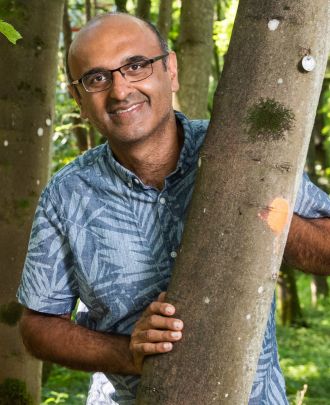Professor Yadvinder Malhi CBE FRS
About
Yadvinder Malhi CBE FRS is Professor of Ecosystem Science at the Environmental Change Institute, School of Geography and the Environment, and Jackson Senior Research Fellow at Oriel College.
Professor Malhi explores the functioning of the biosphere and its interactions with global change, including climate change. He has a particular fascination with and love for tropical forests, though he has recently been spotted in ecosystems ranging from savannas, the Arctic, tropical coral reefs and Oxfordshire’s woodlands and floodplain meadows.
He looks at how natural ecosystems may be shifting in response to global atmospheric change, and how protecting or restoring natural ecosystems can help tackle climate change, and help adaptation to the consequences of climate change.
His team at the Environmental Change Institute is known for collecting intensive field data from fascinating but sometimes tough and remote forests. They have ongoing programmes of research in Asia, Africa, the Amazon and Andes regions, and Oxford's own Wytham Woods. A new recent focus has been on nature recovery and biodiversity restoration in the UK.
While addressing fundamental questions about ecosystem function and dynamics, his research findings are significant for conservation and adaptation to climate change. He is a Trustee of the Natural History Museum of London, President-Elect of the British Ecological Society, chairs a number of programmes on biodiversity at the Royal Society, and is a scientific advisor on nature restoration for the UK government and the government of Scotland.
He leads an active Ecosystem Dynamics research lab focussing on forest vegetation-atmosphere interactions, employing field studies, satellite remote sensing and ecosystem modelling.
Expertise
- Ecosystems
- Forests, tropical forests, rainforests
- Climate change
- Biodiversity
- Carbon
- Nature recovery
- Rewilding
- Savannas
- Anthropocene
- Amazon
- Africa
Selected publications
- Climate change and ecosystems: threats, opportunities and solutions. Philosophical Transactions of the Royal Society B 375 (1794), 20190104. Malhi Y, Franklin J, Seddon N, Solan M, Turner MG, Field CB, Knowlton N (2020)
- New perspectives on the ecology of tree structure and tree communities through terrestrial laser scanning. Interface Focus, 8(2). Malhi, Y., Jackson, T., Bentley, L.P., Lau, A., Shenkin, A., Herold, M., Calders, K., Bartholmeus, H. and Disney, M.I. (2018)
- The concept of the Anthropocene. Annual Reviews in Environment and Resources. Malhi, Y. (2017)
- Megafauna and ecosystem function from the Pleistocene to the Anthropocene, Proceedings of the National Academy of Sciences of USA, 113 (4) 838-846. DOI 10.1073/pnas.15025. Malhi Y., Doughty C.E., Galetti M., Smith F.A., et al. (2016)
- Tropical forests in the Anthropocene, Annual Review of Environment and Resources, Vol. 39: 125-159. DOI: 10.1146/annurev-environ-030713-155141. Malhi Y. , Gardner T.A., Goldsmith G.R., Silman M.R., Zelazowski P. (2014)
- Synthesis: African rainforests: past, present and future. Phil Trans R Soc B 368: 20120312. Malhi, Y., Adu-Bredu, S., Asare, R.A., Lewis, S.L., Mayaux, P. (2013)
- Exploring the likelihood and mechanism of a climate-change-induced dieback of the Amazon rainforest, Proceedings of the National Academy of Sciences of the United States of America, 106, 20610-20615. Malhi, Y., et al (2009)
- ‘Climate change, deforestation and the fate of the Amazon', Science, 319, 169-172. Malhi, Y., Roberts, J.T., Betts, R.A., Killeen , T.J. and Nobre , C.A. (2008)
Media experience
Professor Yadvinder Malhi has extensive experience of TV programmes and radio, and of providing comment to journalists on contemporary news items.
Recent media work
- Untouched nature was almost as rare 12,000 years ago as it is now (New Scientist, 2021)
- Why the Amazon doesn't really produce 20% of the world's oxygen (National Geographic, 2019)
- Amazon rainforest fires: Ten readers' questions answered (BBC News, 2019)
- Has humankind driven Earth into a new epoch? (Knowable Magazine, 2018)
- What killed the giant beasts - climate change or man? (The Guardian, 2014)
